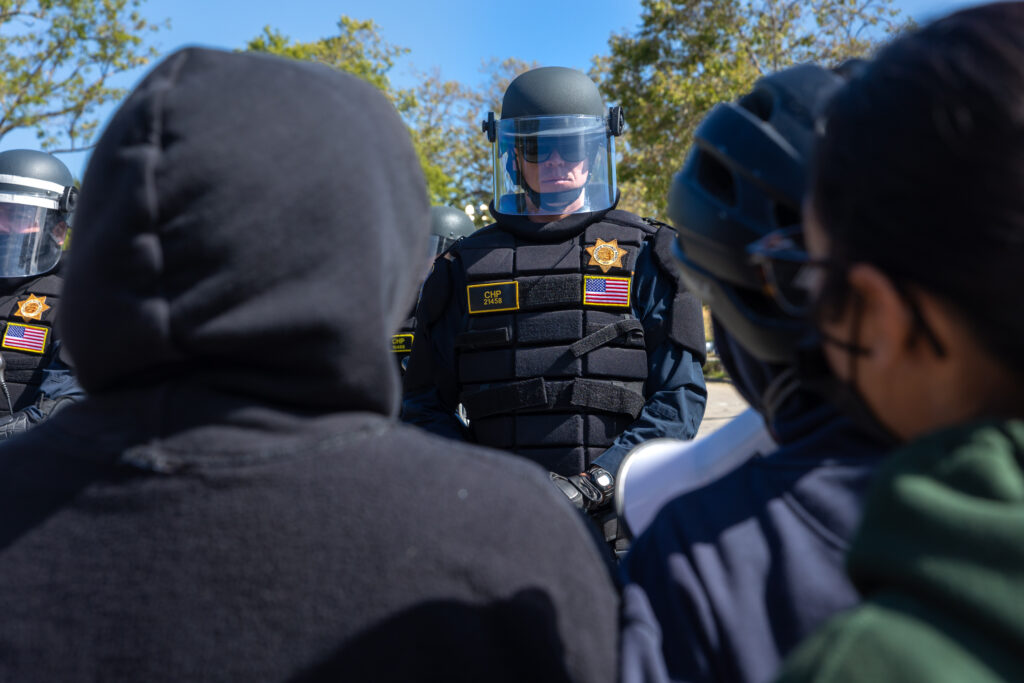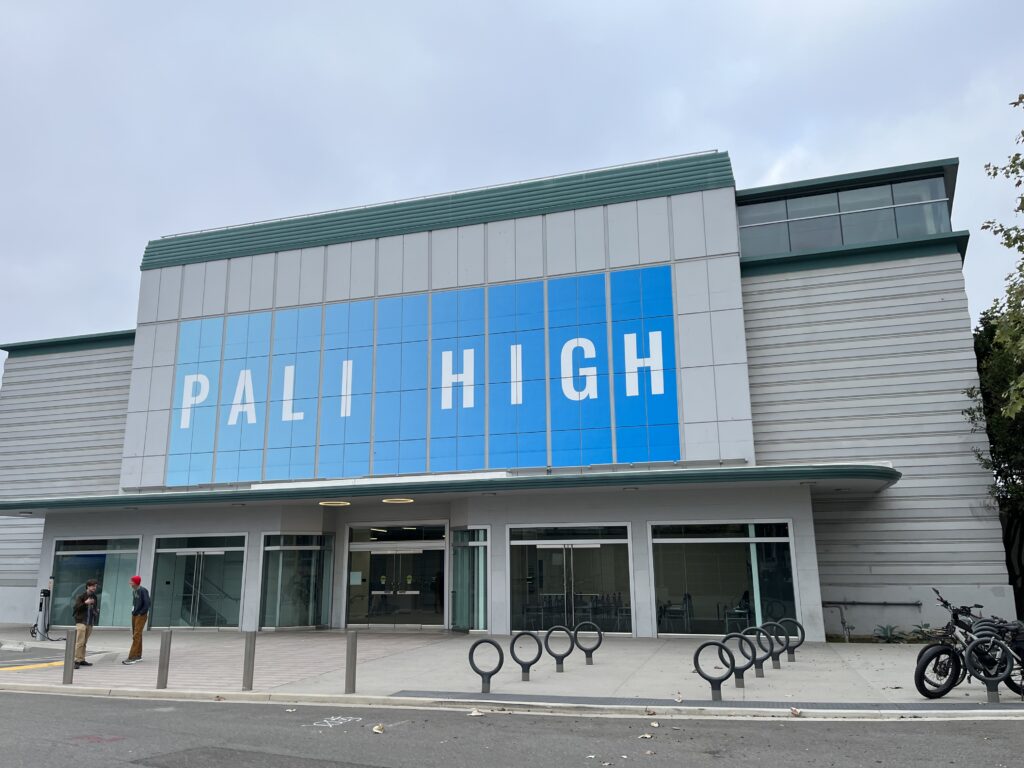
Police and protesters faced off on May 31, 2024, at UC Santa Cruz.
Credit: Photo by Kevin Painchaud / Lookout Santa Cruz
Civil rights groups representing two students and one professor are suing the University of California Santa Cruz, alleging that the campus unlawfully banned students and faculty from campus last spring after they participated in pro-Palestinian protests.
By filing the lawsuit, the civil rights groups, including the ACLU of Northern California, are seeking an injunction to prevent the university from banning students again, if there are additional protests in the upcoming fall term, which begins later this month.
The complaint, filed in Santa Cruz County Superior Court on Monday, says that more than 110 students and faculty were banned from campus for up to 14 days after being arrested at a pro-Palestinian encampment on May 31. Campus officials at the time invoked section 626.4 of California’s penal code, which allows campus chancellors to ban individuals from campus for up to two weeks if they disrupt the orderly operation of the campus.
The lawsuit, however, alleges that campus officials violated the law by not first providing the individuals with a hearing before banning them. The lawsuit cites precedent in a California Supreme Court case, Braxton v. Municipal Court, when the court ruled that campus officials can ban someone without a hearing only if their continued presence “constitutes a substantial and material threat of significant injury to persons or property.” According to the lawsuit, the campus didn’t provide the banned individuals with findings about how they presented such a threat.
The bans had consequences for students and faculty. One of the student plaintiffs, Laaila Irshad, ended up failing multiple classes required for her biology major because she wasn’t able to turn in assignments, meet with her professors or access her computer. Christine Hong, another plaintiff and a professor of critical race and ethnic studies, struggled to prepare for a summer class she would teach on the Korean War.
“Even though these were short-term bans, they had a significant impact on the students as well as faculty members who were instantly banished from campus,” said Rachel Lederman, senior counsel with the Center for Protest Law & Litigation. “And it’s blatantly illegal.”
UC Santa Cruz officials were not available for an interview. In a statement, a campus spokesperson said “the decisions made in the spring were necessary and critical to preserve safety, access, and operations of the campus.”
The lawsuit comes on the heels of UC President Michael Drake announcing that encampments would be banned across the 10-campus UC system this academic year. He asked each campus to come up with its own policy to enforce those rules.
Fall classes at Santa Cruz begin on Sept. 26. If the plaintiffs are successful in getting an injunction before then, it would apply only to the Santa Cruz campus. But Lederman said she’s hopeful that such a decision would “send a message” to all UC campuses that they “can’t just summarily ban people from campus without a hearing and without finding that the individual poses a danger.”
Irshad, now entering her third year at Santa Cruz, said she ended up changing her major as a result of being banned from campus for 12 days in the spring. She wasn’t able to turn in several assignments during that period, and she couldn’t go to her professors’ in-person office hours to ask for extensions.
She eventually got a hearing on June 11 and her ban was lifted the next day. But by then, it was too late, she said. She ended up failing a chemistry course required for her biology major, as well as a writing course she needed to fulfill one of her general education requirements.
Irshad has since changed her major to critical race and ethnic studies. She previously hoped to pursue a career in environmental restoration, but has set aside that goal.
“I spent the past two years of my college education paying for classes within bio and now have to make up for lost time, I guess,” she said.
Ahead of the fall quarter, Irshad isn’t sure if she will participate in protests again. “I know I have a right to protest. I just am very scared about the impact or the ramifications of what might happen,” she said.
It wasn’t only students who were impacted by the bans. Hong, the faculty plaintiff, had planned to spend the final weeks of the spring term preparing to teach a summer class about the Korean War.
Hong needed to record lectures for the course, which was online and asynchronous. She said she had a “critical window of time” in late May and early June when she wanted to record them, but she didn’t have access to the campus recording studio nor to the tech staff who would have helped her edit the lectures. She also couldn’t use her office, where she keeps books and other course materials that would have helped her further prepare for the class.
Hong’s ban from campus was lifted after 11 days. She ended up offering the class anyway, which had about 75 students. But she said there’s “no question” the quality of the course suffered because of the time she wasn’t able to spend preparing to teach it.
“Who gets impacted by this? It’s the students; the students get impacted by this,” she said.




